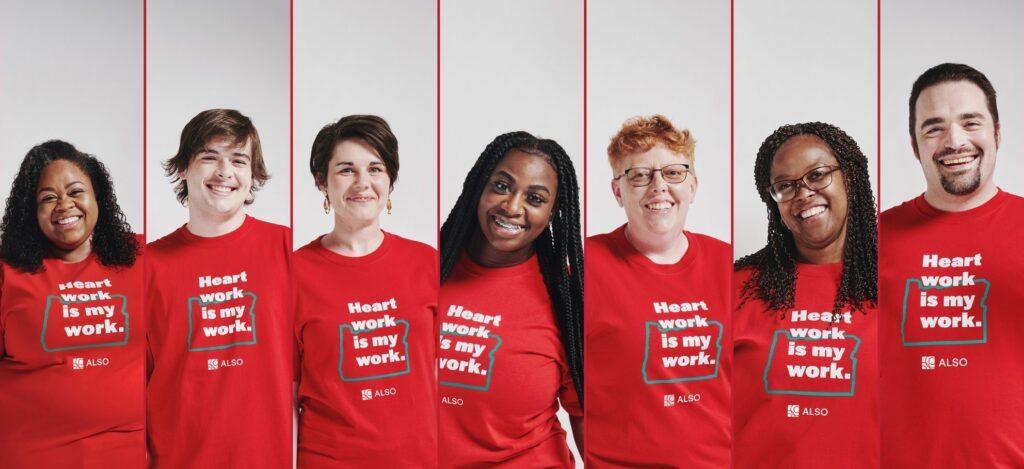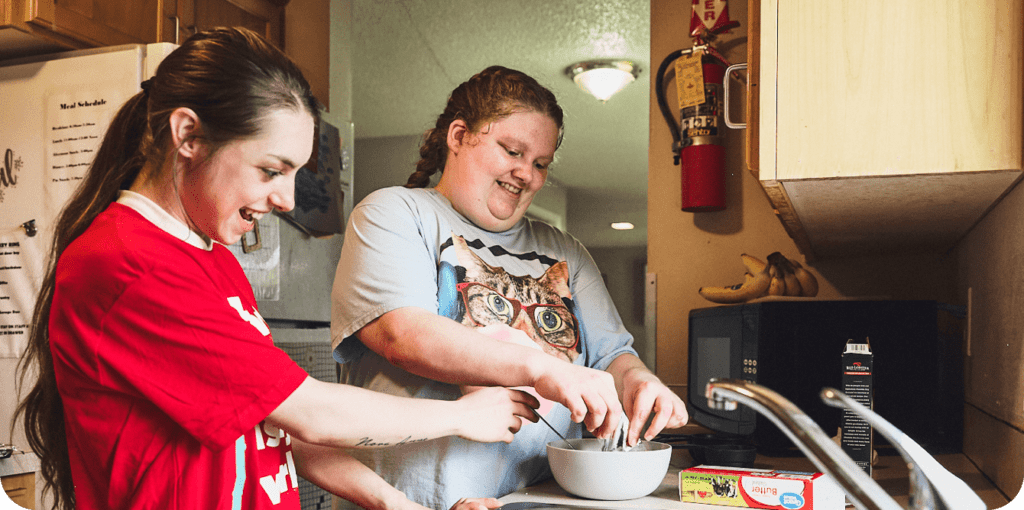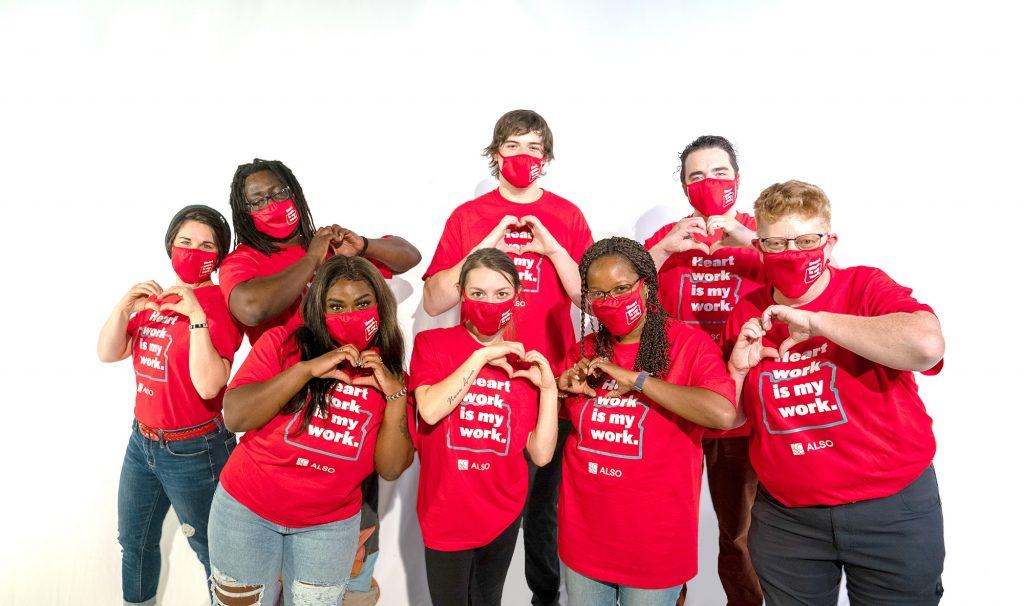Support our diverse communities by buying tickets from the ALSO HEARTS raffle fundraiser! Tickets are available until July 31st, 2025.
Support our diverse communities by buying tickets from the ALSO HEARTS raffle fundraiser! Tickets are available until July 31st, 2025.

The most rewarding jobs are often the most challenging. That’s definitely the case when it comes to a career as a direct support professional (DSP). At ALSO (Advocates for Life Skills and Opportunity), we can say for certain that the many rewards far outweigh any of the challenges. We’re a nonprofit service provider for people with developmental and intellectual disabilities that currently serves nine Oregon counties and continues to grow.
Are you wondering if you’d like to become a DSP? Are you an experienced DSP looking for a change?
At ALSO, we’ve been at this since 1997. In fact, we’re proud to say that we have a reputation in the United States as a premier provider of person-centered services that help people with disabilities achieve goals of competitive employment, community inclusion, and independent living. So, let’s discuss specifics about direct support professionals and what characteristics, skills, and personality traits are needed to be successful.

Direct support professionals provide people who have intellectual and/or developmental disabilities with assistance in functioning as independently as possible in the least restrictive environment. DSPs are critical in helping those they support in achieving their full potential as participating members in community living. The professional support they provide goes far beyond being a caregiver. Instead, they foster abilities that facilitate self-confidence and belonging.
That’s why being a direct support professional is so exciting and rewarding! If you choose this career path, there will never be a dull moment! Here are just a few examples of the person-centered supports you would be providing for the people with disabilities:
DSP positions can include being an employment specialist or job coach. Those with previous experience can achieve positions as program managers or frontline supervisors (a combination of administrative and frontline duties).
LEARNING MORE: Bring Heartwork into Your Life as a Part-time DSP
Lori’s Work at ALSO

We admit that being a direct support professional isn’t for everyone. For example, it can be quite complicated to help someone find a job that will give them satisfaction, but also fulfill job description requirements. In addition to an intellectual or developmental disability, someone may also have a mental health condition, such as depression.
So, what traits are needed to fulfill the important role of direct support professional? Are there any specific skills that make a great DSP? Many of these individual characteristics overlap with the National Alliance for Direct Support Professionals (NADSP) Code of Ethics. As we share this list with you, please know that nobody’s perfect! We all have our strengths and weaknesses.
There’s a reason why the phrase, “walk a mile in someone’s shoes,” has been around for so long. Those of us who have empathy and compassion can see the world from a different perspective. When someone is feeling confused, frustrated, or sad, we’re able to share in those feelings. Similarly, when someone feels joyful about achieving a goal or has good news, we’re quick to celebrate along with them. These traits help the people we support feel that they have a partner in navigating the challenges of school, jobs, and social life.
Compassion takes empathy a step further by transforming empathetic feelings into meaningful action. Such actions can be either small gestures or something more complex. Take a look at these two examples:
Critical thinking is a rich and continuously evolving concept that has been explored for over 2,000 years. So, you can imagine that there has been a great deal of thinking about critical thinking!
A good critical thinker has the following habits:
Another description comes from educational psychologist Linda Elder. According to Dr. Elder, people who think critically strive to analyze, assess, and improve their own thinking skills. As good critical thinkers, we live in a manner that is rational and reasonable, but also empathetic. We are also considerate of the rights and needs of others.
For direct support professionals, no two days are exactly the same. One day we may be accompanying someone to a job interview, while the next day we are helping them figure out why the laundry machine is overflowing with soap. We really think on our feet and are skilled at adapting to an ever-changing environment. In addition, all of those we support have a wide variety of needs and goals. Someone with cerebral palsy may have physical challenges related to completing personal care, but someone else may have difficulty managing frustration tolerance when they are disappointed.
There are many things that one needs to be patient about when working as a DSP. People with developmental and/or intellectual disabilities may have several challenges that interfere with successful functioning in the home or community:
In order to improve these skills, DSPs need to be extremely patient with repeated instructions and skill practice. By demonstrating caring patience with the people that we support, we set an excellent example of teaching them to be patient with themselves.
LEARNING MORE: Accessibility Challenges Faced by People with Intellectual Disabilities
The people in our profession must be dependable and reliable in nature in order to gain trust. We must have good organizational skills so that we can fulfill the commitments we make to the people we support. These characteristics are critical not only for the people we support, but other direct care workers, service providers, and potential employers with whom we collaborate. As visionaries and advocates for full community inclusion and equitable access for people with developmental and intellectual disabilities, we must consistently demonstrate reliability, dependability, and organization.
A professional DSP has their eyes and ears on alert at all times. For example, we may be in a study room helping someone with their homework while someone else is preparing a meal. It’s a good idea to occasionally check on that person in the kitchen to make sure all is going well.
In addition, we must use our intuitive senses to be open to indications of concern, discomfort, or anxiety. If this happens, it’s always helpful to provide ample opportunities to express concern.
A huge part of being an effective DSP is the ability to communicate clearly and accurately. All communications must be:
It’s extremely important that the communicator checks for understanding to ensure the receiver understands what is being said.
At ALSO, we take the name, Advocates for Life Skills and Opportunity quite seriously. Thus, advocacy is firmly rooted in our organizational culture. On a daily basis, we’re devoted partners with the individual and their support team. This includes direct care staff, family members, and outside service providers.
The advocacy skills of a DSP are never directive nor authoritative. It’s a delicate collaboration to provide the needed assistance in helping individuals with all disabilities to live a life of their own choosing. Additionally, we celebrate any efforts towards self-advocacy, so that they can use their own voice to stand up for their rights to full community inclusion.
LEARNING MORE: 6 Famous Disability Advocates

The positive impact of ALSO on our community members with developmental and intellectual disabilities is expanding rapidly. If you’re a job seeker with any of the above characteristics, we would love to hear from you! Your level of experience doesn’t matter nearly as much as the abilities our team has described today.
We’re excited to announce several upcoming hiring events at our Portland Office at 10541 SE Cherry Blossom Drive (11AM to 3PM):
OR

Sign up for our newsletter to get our latest news, content, and job opportunities.
Help us ensure that everyone has the same opportunities in their home, workplace and community. Let’s make dreams!
